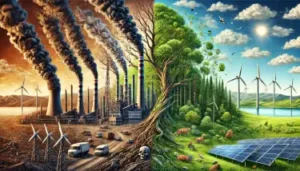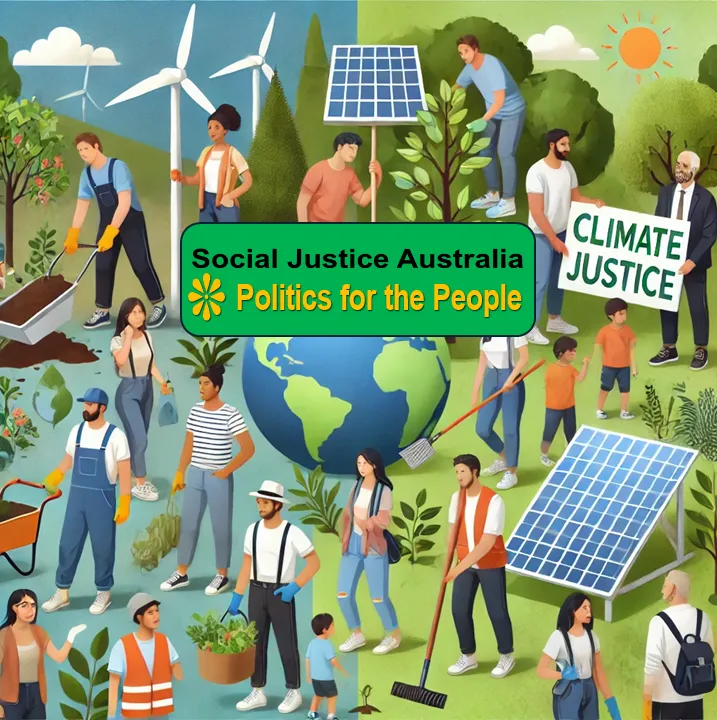Description
Discover why climate change is a social justice issue and how Australia can address climate inequality using its monetary sovereignty.
Introduction
 Climate change, is a social justice issue more than just an environmental crisis; it’s a social justice issue that disproportionately affects marginalised communities. While climate change impacts everyone, the burden is not shared equally. Low-income families, Indigenous communities, and developing nations endure the most of the rising temperatures, extreme weather events, and environmental degradation.
Climate change, is a social justice issue more than just an environmental crisis; it’s a social justice issue that disproportionately affects marginalised communities. While climate change impacts everyone, the burden is not shared equally. Low-income families, Indigenous communities, and developing nations endure the most of the rising temperatures, extreme weather events, and environmental degradation.
The concept of climate justice acknowledges that those who have contributed the least to climate change suffer its worst consequences. Governments and corporations prioritise profits over sustainability, worsening existing inequalities.
This article explores how climate change is a social justice issue and how Australia can adopt fairer policies using its monetary sovereignty to ensure fair climate action.
Understanding Climate Justice
Climate justice is the recognition that climate change is deeply intertwined with social and economic inequalities. The key principles of climate justice include:
• Equitable Distribution of Resources: Ensuring vulnerable communities receive financial and technological support for climate adaptation.
• Intergenerational Equity: Protecting the environment for future generations.
• Human Rights Protections: Preventing forced migration and land displacement due to climate disasters.
• Corporate Accountability: Holding corporations responsible for environmental damage.
The disproportionate impact of climate change on marginalised groups highlights why addressing climate change requires a justice-oriented approach rather than a purely environmental one.
Who Is Most Affected by Climate Change?
Low-Income Communities
Low-income households often live in areas with higher exposure to pollution and lack the resources to recover from climate disasters. Rising energy costs make it difficult for these communities to afford cooling or heating during extreme weather events. The lack of green infrastructure in lower-income areas worsens their vulnerability to heatwaves and flooding.
Indigenous Peoples
Indigenous communities worldwide face threats to their land, culture, and traditions due to climate change. In Australia, Aboriginal and Torres Strait Islander peoples have lived in harmony with nature for thousands of years. However, rising sea levels, droughts, and mining projects threaten their sacred lands, forcing displacement and loss of cultural heritage.
Workers and Farmers
• Agricultural workers face unpredictable weather patterns, leading to crop failures and economic hardship.
• Outdoor labourers endure extreme heat conditions, increasing health risks.
• Fisheries and coastal communities suffer from ocean acidification and overfishing, jeopardising their livelihoods.
The Global South vs. The Global North
Developing nations contribute the least to global carbon emissions but suffer the most from climate-related disasters. Countries like Bangladesh, Tuvalu, and Vanuatu face existential threats from rising sea levels. Meanwhile, wealthier nations continue to emit high levels of greenhouse gases while avoiding the most severe consequences.
Environmental Racism and Climate Inequities
Environmental racism refers to how marginalised communities are disproportionately exposed to pollution, toxic waste, and environmental hazards due to discriminatory policies. Examples include:
• Australia’s gas and mining projects disproportionately affecting Indigenous lands.
• Urban heat islands in low-income neighbourhoods due to lack of tree cover and green spaces.
• Global waste disposal, where wealthier nations export toxic waste to poorer countries.
Addressing these inequities requires systemic changes in how environmental policies are developed and implemented.
Government and Corporate Accountability
The Role of Fossil Fuel Corporations
Major corporations continue to profit from fossil fuels, engaging in greenwashing while lobbying against climate regulations. Australia’s coal and gas industries have heavily influenced government policies, delaying necessary climate action.
Government Policies and Failures
Despite scientific warnings, many governments, including Australia’s, prioritise economic growth over environmental sustainability. Public money is used to subsidise fossil fuel industries instead of funding renewable energy and climate adaptation measures.
The Wealth Divide and Climate Change
Wealthier individuals and corporations contribute disproportionately to carbon emissions, while the poorest suffer the worst effects. The richest 10% of the global population are responsible for half of all emissions. Addressing this divide is crucial for a fair transition to sustainable solutions.
Climate Refugees and Displacement
As climate disasters increase, more people are forced to migrate. Climate refugees, particularly from Pacific Island nations, lack legal recognition under international law, leaving them without protections. Australia’s policies must acknowledge and support those displaced by climate change through sustainable resettlement programs.
Solutions and the Path to Climate Justice
Just Transition to Renewable Energy
A just transition ensures that workers in fossil fuel industries are supported as economies shift towards clean energy. This includes:
• Investing in green jobs that offer fair wages and stability.
• Training programs for workers transitioning from fossil fuel sectors to renewable industries.
• Government-funded renewable energy projects using Australia’s monetary sovereignty.
Policy Changes for Equity
Governments must implement policies that ensure fair climate action, including:
• Carbon taxes on polluting industries.
• Stronger environmental protections for Indigenous lands.
• Expanding social safety nets for climate-affected communities.
Community-Led Climate Action
Grassroots movements are leading the fight for climate justice. Indigenous communities, youth activists, and local organisations play a key role in advocating for sustainable policies. Supporting these movements is essential for lasting change.
Q&A Section
Q: Why is climate change considered a social justice issue?
A: Climate change disproportionately affects marginalised communities, including low-income families, Indigenous peoples, and developing nations. These groups often have fewer resources to adapt and recover from climate disasters.
Q: What is Australia’s role in addressing climate justice?
A: Australia, as a developed nation, has the economic capability to invest in renewable energy, support climate refugees, and implement policies that hold polluters accountable while ensuring social equity.
Q: How can individuals contribute to climate justice?
A: Individuals can support climate justice by advocating for policy changes, reducing personal carbon footprints, supporting Indigenous-led climate initiatives, and holding corporations accountable for environmental harm.
Call to Action
Do you see opportunities for community-driven change in Australia’s dollar sovereignty?
If you found this article insightful, explore more about political reform and Australia’s monetary sovereignty on Social Justice Australia: https://socialjusticeaustralia.com.au/
Share this article with your community to help drive the conversation toward a more just and equal society.
Click on our “Reader Feedback”.
Let us know how our content has inspired you. Submit your testimonial and help shape the conversation today!
Additionally, leave a comment about this article below.
Support Social Justice Australia – Help Keep This Platform Running
Social Justice Australia is committed to delivering independent, in-depth analysis of critical issues affecting Australians. Unlike corporate-backed media, we rely on our readers to sustain this platform.
If you find value in our content, consider making a small donation to help cover the costs of hosting, maintenance, and continued research. No matter how small, every contribution makes a real difference in keeping this site accessible and ad-free.
💡 Your support helps:
✅ Keep this website running without corporate influence
✅ Fund research and publishing of articles that challenge the status quo
✅ Expand awareness of policies that affect every day Australians
💰 A one-time or monthly donation ensures Social Justice Australia stays a strong, independent voice.
🔗 Donate Now
Thank you for being part of this movement for change. Your support is truly appreciated!

